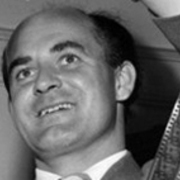
Derek Wright
During the 1944 Christmas school holidays, Derek Wright revealed a desire to travel when he and a school friend toured the North Island by bicycle. Years later his job would enable him to travel as far afield as the Pacific Islands and the South Pole using many other means of transportation.
On leaving school Wright joined Government filmmakers the New Zealand National Film Unit as a laboratory assistant. For four years, travel was largely confined to commuting from his home in the Wellington suburb of Khandallah to NFU's Miramar studios. Then the opportunity arose for him to train as a cameraman. One of his first jobs, as assistant cameraman on The Elysian Bus (1951), was filmed in the studio, but opportunities for roaming soon followed.
From July to November 1952 he spent four months on location in Fiji as a props man during filming of Burt Lancaster adventure His Majesty O'Keefe. Back in New Zealand he was soon filming items for the NFU's new magazine-film Pictorial Parade. The first was a short item World Shearing Record recording Godfrey Bowen's achievement.
He went on to film or direct about 80 items in this long-running series. Most of the filming was outside the studio, documenting such varied pursuits as canoeists negotiating rapids on the Waikato River, a round-up on Molesworth Station, and the trial run of a new railcar.
He also worked on significant documentary films such as The Treatment of Cerebral Palsy in New Zealand (1955) and A Letter to the Teacher (1957). Working on the Safety in the Mountains' film Snowcraft (1956) introduced him to the demands of filming in icy conditions, and gave him a taste of things to come.
New Zealand was preparing to participate in International Geophysical Year, and play a part in the first crossing of the Antarctic continent. Under Sir Edmund Hillary, the New Zealanders began their training in the snow and ice of Tasman Glacier. Wright was on hand to record their training for film Polar Exercise. He then accompanied the 1956-7 summer party to the Antarctic and filmed the setting up of Scott Base. The first film to result from his time in the Antarctic was Antarctic Adventure.
The following summer he returned to the Antarctic. Having in Hillary's words already proved "an adept tractor driver", Wright became more than just an official cinematographer after injuries to members of the polar party gave him the opportunity to participate in Hillary's dash for the Pole.
His second Antarctic film The Great Achievement covered this part of the Trans-Antarctic Expedition, and some of the film he shot was used in the official film of the expedition, Antarctic Crossing which was nominated in the feature-length documentary category of the 1959 Academy Awards. Some of Wright's expedition footage can also be seen in the 'Big Ice' edition of The Years Back series.
With the arrival of television in Wellington in 1961, Wright was one of the NFU cameramen who filmed items for TV news broadcasts on Channel 1. He was cameraman on three of the programmes of the These New Zealanders series broadcast in 1964. By this time he was looking for a change, and it was a made-for-television film, Songs of their Forefathers (1965), on which he received his first credit as director.
Another made-for-television film, The Cook Islands Look Ahead (1965), saw him travel again to the Pacific Islands. On further trips to the islands he made the short colour films The Friendly Isles (1969) and Atoll People (1970) for theatrical release.
His biggest job for television was writing and directing the NFU's thirteen-part historical series The Years Back. Broadcast in 1973, it included one programme devoted to New Zealand's role in the Antarctic, incorporating much footage he had taken 15 years earlier.
On another big job, the official film of the Xth British Commonwealth Games, Games 74, he filled the role of associate producer. He worked on later films as producer, although occasionally he directed films, among them Racing Rivers (1976) and White Water Ride (1981). One of the last films he directed for the NFU was From the Ground Up (1986), which he also wrote and produced.
In 1987 he completed 40 years with the NFU, but wasn't ready to retire completely from film making. In 1988 he set up his own company, Derek Wright Productions Ltd and continued in film production independently until his death on 27 January 1994. In a final journey, his body was taken to Kauri Cemetery, Whangarei, for burial.
Writing and Original Research by Clive Sowry.
Sources include
Wright, Robertson Derek (Death Notice) – The Evening Post, 29 January 1994, page 47
'Camera Usually In Wrong Place. Antarctic Film Work Discussed' – The Evening Post, 15 December 1958, page 12
Edmund Hillary, View from the Summit (London: Harper Collins Publishers, 1998)
Paul Dalrymple, 'We Have Visitors' – Antarctic, A News Bulletin published quarterly by the New Zealand Antarctic Society, Vol 1 Number 10, June 1958, page 278
'Superb Antarctic Film. 'Great Achievement' Is Thrill To View' – The Evening Post, 1 April 1958, page 24
' "Scoop" Film of Polar Journey' – The Dominion, 6 January 1958, page 10
'Cameraman Prefers to Photograph Machines' – The Dominion, 6 October 1956, page 13
'Film Unit Men Develop New Habits' – The Evening Post, 18 February 1950, page 12
'Cycling Holiday. Two Wellington Boys' – The Evening Post, 5 February 1945, page 8